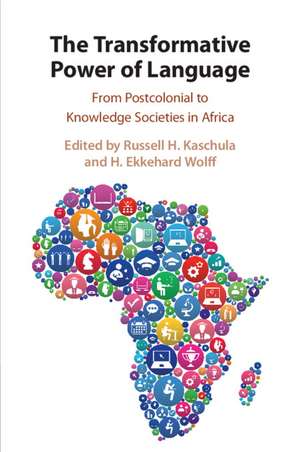The Transformative Power of Language: From Postcolonial to Knowledge Societies in Africa
Editat de Russell H. Kaschula, H. Ekkehard Wolffen Limba Engleză Paperback – 5 apr 2023
Toate formatele și edițiile
| Toate formatele și edițiile | Preț | Express |
|---|---|---|
| Paperback (1) | 193.90 lei 6-8 săpt. | |
| Cambridge University Press – 5 apr 2023 | 193.90 lei 6-8 săpt. | |
| Hardback (1) | 731.05 lei 6-8 săpt. | |
| Cambridge University Press – 9 sep 2020 | 731.05 lei 6-8 săpt. |
Preț: 193.90 lei
Nou
Puncte Express: 291
Preț estimativ în valută:
37.10€ • 40.43$ • 31.26£
37.10€ • 40.43$ • 31.26£
Carte tipărită la comandă
Livrare economică 23 aprilie-07 mai
Preluare comenzi: 021 569.72.76
Specificații
ISBN-13: 9781108712774
ISBN-10: 1108712770
Pagini: 394
Ilustrații: 43 b/w illus. 31 tables
Dimensiuni: 152 x 229 x 21 mm
Greutate: 0.53 kg
Editura: Cambridge University Press
Colecția Cambridge University Press
Locul publicării:Cambridge, United Kingdom
ISBN-10: 1108712770
Pagini: 394
Ilustrații: 43 b/w illus. 31 tables
Dimensiuni: 152 x 229 x 21 mm
Greutate: 0.53 kg
Editura: Cambridge University Press
Colecția Cambridge University Press
Locul publicării:Cambridge, United Kingdom
Cuprins
Introduction: Transformative power and resourcefulness of African languages in the information and knowledge age Russell H. Kaschula and H. Ekkehard Wolff; Part I. Mental decolonisation and cultural diversity: 1. The role of African languages in decolonising South African universities Thulani Mkhize; 2. Adapt or die – Maintaining or decolonising language practices? Theodore Rodrigues; 3. Decolonising our minds, decolonising our languages: A mentalist approach to language attitudes Mantoa Motinyane; Part II. Multilingualism and intellectualisation of African languages: 4. Transformative power of language policies in higher education: A legal English approach or a linguistic African language approach? Zakeera Docrat and Russell H. Kaschula; 5. African languages in transformation: Challenges and opportunities for Zimbabwe and South Africa Emmanuel Sithole and Ziyanda Yola; 6. Linguistic diversity in higher education: inclusion or exclusion? Zakhile Somlata; 7. An impact study with reference to isiXhosa and Afrikaans multilingual glossaries for 1st year Law of Contracts students at Cape Peninsula University of Technology Linda Manashe, Boniface Kabaso, Monwabisi K. Ralarala, and Eunice Ivala; 8. The need for multicultural and multilingual sensitivity in transforming Graphic Design curriculum in a University of Technology Lindie Bhebhe, Monwabisi K. Ralarala, and Alettia Chisin; 9. An analysis of the language legislation effects in the banking sector: Towards the realisation of multilingualism in South Africa Menzi Zamokwakhe Thango and Wisdom Ntando Moyo; Part III. Digitalisation and democratisation of knowledge: 10. African language resources for knowledge societies Justus C. Roux; 11. Wikipedia as transformative multilingual knowledge resource Laurette Pretorius and Friedel Wolff; 12. Corpora as agency in the intellectualisation of African languages Langa Khumalo; 13. From postcolonial African language lexicography to globally competitive e-lexicography in Africa D. J. Prinsloo and Nompumelelo Zondi; Part IV. Interlingual and intercultural cross-fertilisation: 14. Orality in the Digital Age Janet Hayward; 15. Interpreting research in South Africa: Where to begin to transform? Herculene Kotzé and Kim Wallmach; 16. Exploring the potential of increasing epistemological access for university students of African languages through the translation of English academic texts Ntombovuyo Ngaphu; 17. Translation in foreign language teaching – cultivating critical reflection and symbolic competence Natasha Engelbrecht.
Recenzii
'A welcome and important contribution to the study of the role of language in its broader social context. The focus on language as an agent of development and societal change, and particularly the use of local languages in the decolonization of higher education and knowledge creation in Africa, is especially welcome.' Bruce Connell, Professor of Linguistics, York University
'This volume responds to Ngugi wa Thiong'o's call to 'decolonise the mind' in countries of the Global South, particularly in Africa. The authors draw attention to: the necessity of, how to bring, and how to resource multilingual pedagogies in higher education. It is knowledge that resides within African languages that will unsettle coloniality and empower 'southern' scholars to bring about educational transformation in the Global South.' Kathleen Heugh, Associate Professor in Applied Linguistics, University of South Australia
'… the book is suitable for different audiences including policy makers, executive managers, student teachers, and educators, especially those working in Higher Education Institutes (HEIs) and those working in South Africa. The language of the book is also accessible and is clear for students at the undergraduate and graduate levels. The book provides an excellent starting point for researchers, students and educators who are interested in themes related to the power of languages in education, inclusion, the importance of education using the first language and those who are interested in the South African context or similar contexts.' Shaden Samir Attia, The LINGUIST List
'This volume responds to Ngugi wa Thiong'o's call to 'decolonise the mind' in countries of the Global South, particularly in Africa. The authors draw attention to: the necessity of, how to bring, and how to resource multilingual pedagogies in higher education. It is knowledge that resides within African languages that will unsettle coloniality and empower 'southern' scholars to bring about educational transformation in the Global South.' Kathleen Heugh, Associate Professor in Applied Linguistics, University of South Australia
'… the book is suitable for different audiences including policy makers, executive managers, student teachers, and educators, especially those working in Higher Education Institutes (HEIs) and those working in South Africa. The language of the book is also accessible and is clear for students at the undergraduate and graduate levels. The book provides an excellent starting point for researchers, students and educators who are interested in themes related to the power of languages in education, inclusion, the importance of education using the first language and those who are interested in the South African context or similar contexts.' Shaden Samir Attia, The LINGUIST List
Descriere
A new study of the importance of language for sociocultural change in Africa, from postcolonial to globally competitive knowledge societies.
